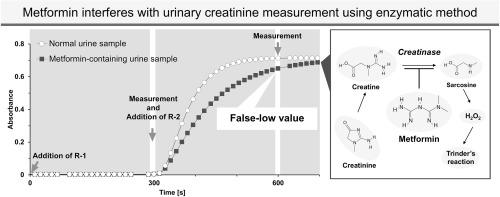Metformin interferes with urinary creatinine measurement using enzymatic method
IF 2.2
Q3 BIOCHEMISTRY & MOLECULAR BIOLOGY
引用次数: 0
Abstract
Abnormal reaction curves were observed in urinary creatinine tests in patients with diabetes undergoing metformin therapy. Therefore, we investigated whether metformin interferes with urinary creatinine measurements.
First, the reaction curves of urinary creatinine measurements from 328 patients were analyzed, focusing on the maximum reaction speed, final reaction speed, and their ratio. Next, the reaction curves of the creatinine solution with and without metformin were analyzed. To elucidate the mechanism of metformin interference, solutions of creatinine, creatine, sarcosine, and hydrogen peroxide with and without metformin were analyzed using a one-reagent measurement in which reagents 1 and 2 were pre-mixed.
As the results, in the 84 patients taking metformin, the maximum reaction speed significantly decreased, whereas the final reaction speed and the ratio of the two speeds significantly increased (p < 0.001). Notably, the area under the curve of the ratio of the two speeds was 0.84 (95 % confidence interval: 0.78–0.89) for detecting metformin use, suggesting that metformin inhibits the series of reactions involved in creatinine measurement and that reaction curve analysis can identify metformin use. Similar results were obtained in experiments using metformin-containing creatinine solutions. Metformin did not interfere with the reactions involving sarcosine or hydrogen peroxide but did interfere with those involving creatinine and creatine, indicating that metformin inhibits creatinase activity.
In conclusion, metformin inhibits reactions involved in urinary creatinine measurement in urine samples, potentially leading to falsely low urinary creatinine values and an inaccurate assessment of kidney function in patients with diabetes.

二甲双胍干扰酶法测定尿肌酐
糖尿病患者接受二甲双胍治疗时尿肌酐检测异常。因此,我们研究了二甲双胍是否会干扰尿肌酐的测量。首先分析328例患者尿肌酐测定的反应曲线,重点分析最大反应速度、最终反应速度及其比值。然后,分析了加二甲双胍和不加二甲双胍时肌酐溶液的反应曲线。为了阐明二甲双胍干扰的机理,采用试剂1和试剂2预混合的单试剂测定法,分析了含二甲双胍和不含二甲双胍的肌酸酐、肌酸、肌氨酸和过氧化氢溶液。结果显示,84例服用二甲双胍的患者,最大反应速度显著降低,最终反应速度及两种反应速度之比显著升高(p < 0.001)。值得注意的是,检测二甲双胍使用的两种速度之比曲线下面积为0.84(95%可信区间:0.78-0.89),表明二甲双胍抑制了肌酸酐测量中涉及的一系列反应,反应曲线分析可以识别二甲双胍的使用。在使用含二甲双胍的肌酐溶液的实验中也得到了类似的结果。二甲双胍不会干扰与肌氨酸或过氧化氢有关的反应,但会干扰与肌酸酐和肌酸有关的反应,这表明二甲双胍抑制了肌酶的活性。总之,二甲双胍抑制尿样中尿肌酐测量的反应,可能导致尿肌酐值过低和糖尿病患者肾功能评估不准确。
本文章由计算机程序翻译,如有差异,请以英文原文为准。
求助全文
约1分钟内获得全文
求助全文
来源期刊

Biochemistry and Biophysics Reports
Biochemistry, Genetics and Molecular Biology-Biophysics
CiteScore
4.60
自引率
0.00%
发文量
191
审稿时长
59 days
期刊介绍:
Open access, online only, peer-reviewed international journal in the Life Sciences, established in 2014 Biochemistry and Biophysics Reports (BB Reports) publishes original research in all aspects of Biochemistry, Biophysics and related areas like Molecular and Cell Biology. BB Reports welcomes solid though more preliminary, descriptive and small scale results if they have the potential to stimulate and/or contribute to future research, leading to new insights or hypothesis. Primary criteria for acceptance is that the work is original, scientifically and technically sound and provides valuable knowledge to life sciences research. We strongly believe all results deserve to be published and documented for the advancement of science. BB Reports specifically appreciates receiving reports on: Negative results, Replication studies, Reanalysis of previous datasets.
 求助内容:
求助内容: 应助结果提醒方式:
应助结果提醒方式:


